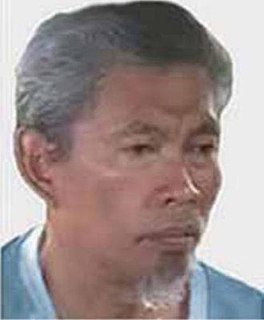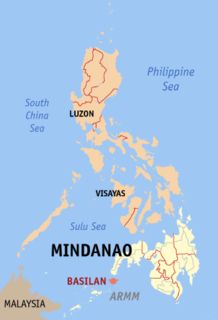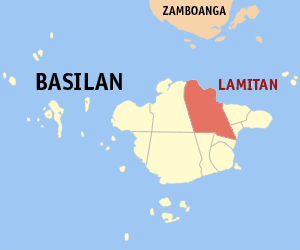This page is based on this
Wikipedia article Text is available under the
CC BY-SA 4.0 license; additional terms may apply.
Images, videos and audio are available under their respective licenses.
The 2002 Zamboanga bombings were a series of attacks perpetrated on the October 2, 17 and 21, 2002, around the southern Philippine port of Zamboanga City, Mindanao island. Eleven people died and over 180 others were wounded in the four bomb attacks allegedly perpetrated by Islamic extremists with connections to the Abu Sayyaf insurgent group.

Khadaffy Abubakar Janjalani was the nominal leader of the Moro militant group known as Abu Sayyaf and the leader of one of its factions.

Mohammed Jamal Khalifa
(1 February 1957 – 31 January 2007) was a Saudi businessman from Jeddah who married one of Osama bin Laden's sisters. He has been accused of funding terror plots and groups in the Philippines in the 1990s while head of the International Islamic Relief Organization branch there. He was murdered in Madagascar in 2007.
Abu Sabaya, born Aldam Tilao, was one of the leaders of the Abu Sayyaf in the southern Philippines until he was killed by soldiers of the Armed Forces of the Philippines in 2002.

Isnilon Totoni Hapilon, also known by the nom de guerre Abu Abdullah al-Filipini, was a Moro Islamist militant affiliated with ISIS.

Jainal Antel Sali Jr. was the leader of Abu Sayyaf, an Islamist terrorist organization affiliated with Al Qaeda.

Radullan Sahiron is a Moro Islamic militant who is the leader of Abu Sayyaf. He is said to have taken command of the organization following the death of Khadaffy Janjalani in September 2006.
Albader Parad was a senior leader of Abu Sayyaf, a group of Islamic militants in the Philippines with links to al-Qaeda. He led the kidnapping of three International Committee of the Red Cross workers in 2009 and was implicated in the 2000 Sipadan kidnappings, where 20 foreign tourists and a Filipino were abducted from the Sipadan Island Diving Resort in Sandakan, Sabah in Malaysia.
Called together in the Sudan by Hassan al-Turabi, the 1991 Popular Arab and Islamic Congress Conference sought to unify Mujahideen and other Islamic elements in the wake of the Soviet withdrawal from Afghanistan and the Iraqi defeat in the Gulf War. It sought to provide an alternative to the Saudi-dominated Organization of the Islamic Conference, although it did not have its financial means.
The civil conflict in the Philippines as of February 2019, consists of an insurgency pitting Government forces against Maoist rebels, that began in 1969 during the rule of Ferdinand Marcos.

The 2000 Sipadan kidnappings was a hostage crisis in Sabah, Malaysia, and the southern Philippines that began with the seizing of twenty-one hostages from the dive resort island of Sipadan at approximately 6:15 p.m. on 23 April 2000, by up to six Abu Sayyaf (ASG) bandits. Taken hostage were 10 tourists from Europe and the Middle East and 11 Malaysian resort workers, 19 non-Filipino nationals in total. The hostages were taken to an Abu Sayyaf base in Jolo, Sulu.
Nasrin As'ad Ibrahim, better known by the nom de guerre Umm Sayyaf, is the widow of Abu Sayyaf, captured in May 2015 by US Delta Force soldiers on the mission where they killed her husband, a suspected leader of the Islamic State.
On 15 May 2015, 1st SFOD-Delta operators from the Joint Special Operations Command based in Iraq conducted an operation in Al-Amr, Syria to capture a senior Islamic State of Iraq and the Levant (ISIL) leader named Abu Sayyaf, resulting in his death when he engaged United States forces in combat, after his location was confirmed by surveillance from British SAS operators. Abu Sayyaf's role in ISIL was managing its gas and oil operations; he had built up a network of traders and wholesalers of ISIL-controlled oil that he helped triple energy revenues for the terror group. His other duties for the group included approving expenses to cover the upkeep of slaves, rebuilding oil facilities damaged by airstrikes and counting of revenue. The wife of Abu Sayyaf, Umm Sayyaf was captured and is currently held by U.S. Forces in Iraq. The operation also led to the freeing of a Yazidi woman who was held as a slave. About a dozen ISIL fighters were also killed in the raid, two US officials said. The Syrian Observatory for Human Rights reported that an additional 19 ISIL fighters were killed in the US airstrikes that accompanied the raid. One official said that ISIL Forces fired at the U.S. aircraft, and there was reportedly hand-to-hand combat during the raid. Sikorsky UH-60 Black Hawk helicopters and Bell Boeing V-22 Osprey tilt-rotor aircraft were used to conduct the raid.
This article contains a timeline of events from January 2015 to December 2015 related to the Islamic State of Iraq and the Levant (ISIL/ISIS). For a list of other time periods, see Timeline of ISIL related events. This article contains information about events committed by or on behalf of the Islamic State, as well as events performed by groups who oppose them.

The Battle of Tipo-Tipo was a military engagement that began in 9 April 2016 at Tipo-Tipo, Basilan Island, Philippines between forces of the Philippine Army and members of the Abu Sayyaf militant group. The battle resulted in dozens of casualties, with at least 18 soldiers and 31 militants reported killed, and more than 70 others injured. It was the largest single loss of life for the Philippine Army since the beginning of the year, and came just a day after the group had released an Italian hostage.

The Siege of Lamitan took place on 2 June 2001 when members of the Islamic terrorist group Abu Sayyaf entered the city of Lamitan, one of two Christian settlements in the predominantly Muslim province of Basilan in the Philippines. They took over a church and a hospital and held priests, medical staff and patients hostage. Government forces surrounded the Muslim extremists, preventing their escape. However, the Abu Sayyaf group managed to break out of the cordon by using their hostages as human shields.

The 2017 Bohol clashes were armed conflicts that took place in April and May 2017 between Philippine security forces and Moro ISIL-affiliated militants led by members of the Abu Sayyaf in Inabanga, Bohol, Philippines. Three Philippine Army soldiers, a policeman, four terrorists and two civilians were killed during the initial firefight. Subsequent firefights between the remaining militants and security forces resulted in the deaths of all the Abu Sayyaf insurgents. A ranking officer of the Philippine National Police linked to Abu Sayyaf attempted to rescue some of the insurgents but was arrested.









